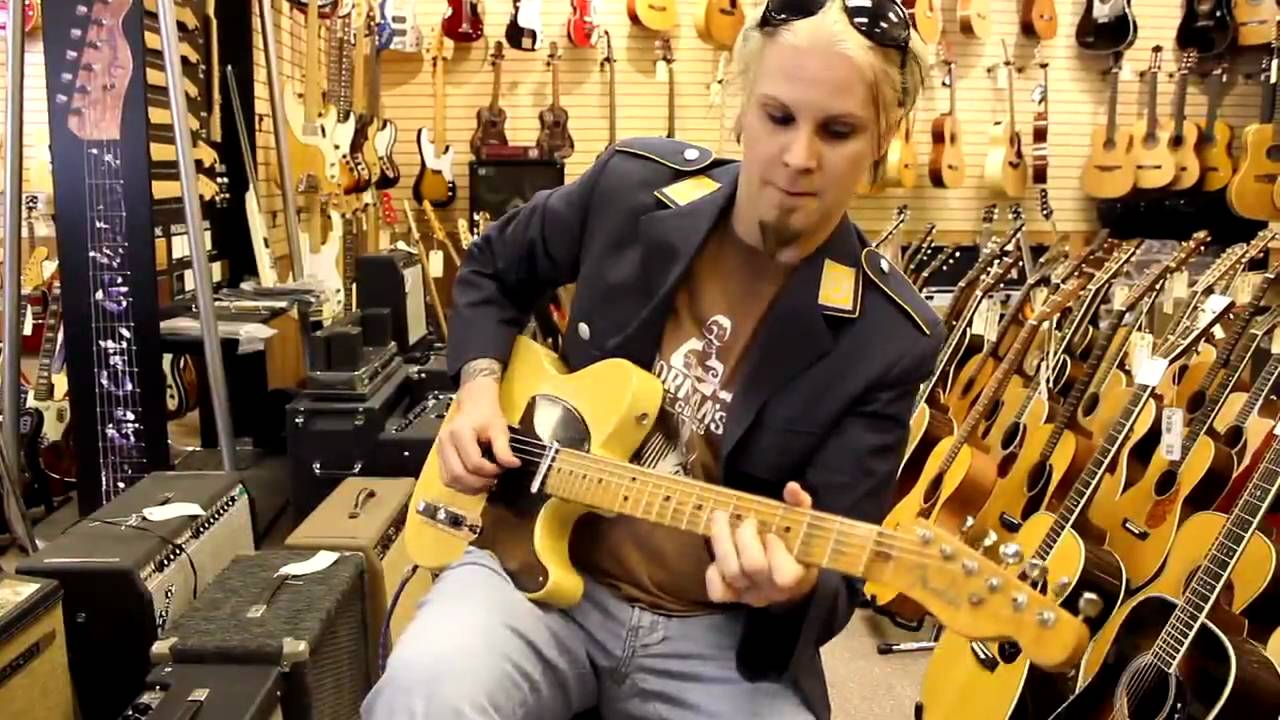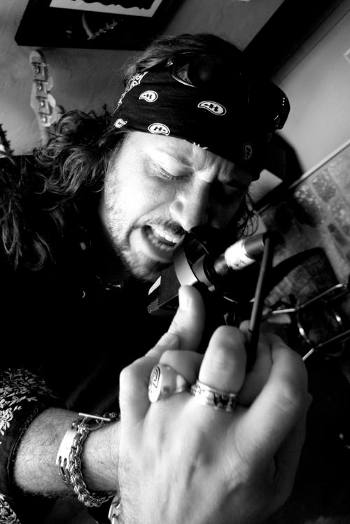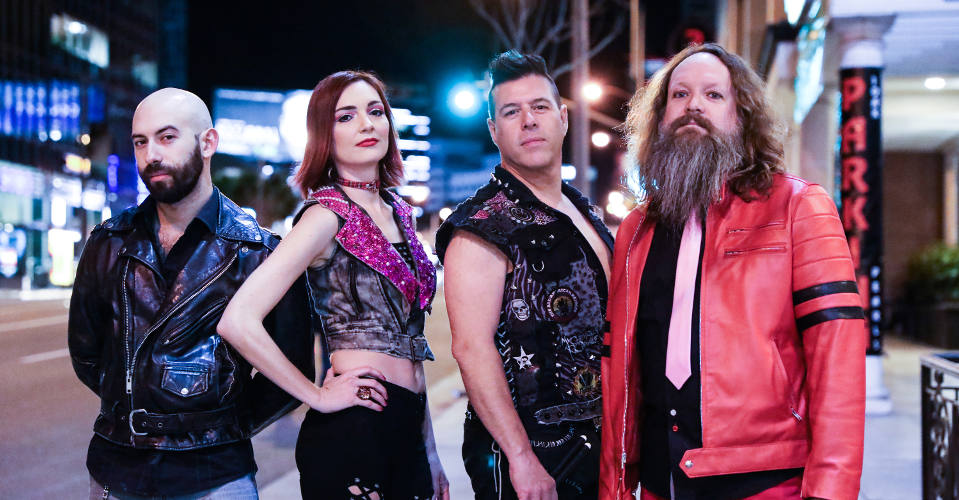
by Alexandra Mrozowska
— Senior Columnist
Whenever you ask musicians about what they think is the greatest achievement of their career, the answers they give are usually strikingly similar. A successful album or a breakthrough performance at a huge open air festival is what qualifies, unless you chat with a music veteran musing on their longevity in the business they didn’t expect four decades prior.
But for Ledfoot aka Tim Scott McConnell, the answer to the question we scribes ask so often is very different. “Finding out who I was,” he says with no hesitation. “I know that if I’m honest with what I do, that’s a good place for me. But it took me a long time to find that.” The music career of this American singer-songwriter and 12-string guitarist – and a creator of music genre Gothic Blues he pursues as Ledfoot – spawns five decades, starting when he was just a teenager. And as Tim checks in with Hardrock Haven on the eve of releasing his new solo album Black Valley, we revisit his beginnings as well as discuss his Gothic Blues formula, building his Ledfoot persona, his past and future collaborations with TNT’s Ronni Le Tekrø, storytelling, the American South… and more.

Hardrock Haven: Recently you’ve released a second single “Take Away The Hurt” off your forthcoming album Black Valley. Do you think it’s representative of what we’ll find on the album?
Tim Scott McConnell: I go to a lot of different places on the record. And it [the single] is indicative of the rest of the record in a sense that it’s kind of no bullshit, you know. So in that way it’s similar.
Hardrock Haven: And what was the process of making the new album like?
Tim Scott McConnell: Last spring, when Corona came, I think I had seven months of touring cancelled. So I was up at the studio that I work at, which is Ronni Le Tekrø’s studio, and we just decided to make the record. Basically every day we’d go in, start a song and finish it. I’m playing everything on the record, so it’s just me and the engineer.
Hardrock Haven: Black Valley will be your fifth solo album released as Ledfoot. Why did you decide to create not only an artist name but the entire persona behind it and what led to your defining your music as Gothic Blues genre-wise?
Tim Scott McConnell: You know, I started performing back in the late ‘70s. I’ve done a lot of record deals and a lot of records and at one point I didn’t really want to be doing this for the wrong reasons. And I play a whole lot of instruments, so I kind of took the whole lot of techniques… I grew up listening to roots music and Appalachian music and shit like that, and I just took elements from everything, like also coming from CBGB and New York in the ‘70s and the ‘80s and my Southern background and decided I was gonna just do that. The reason I called it Blues was because the original Blues guys just had to sit and deliver everything in a room full of people. But it wasn’t that “I gave my love a flower…” (sings) kind of fucking bullshit (laughs). It was like that it moved you, that it was like Rock’n’Roll, that it fucking kicked your ass. And I thought the only way you can do that is present it in a different way, so I kind of took [it all] together and reworked myself. I’m an introvert by nature, despite my job, so after being a solo artist for so long I missed the anonymity and being not known by the name. And Gothic Blues just came about because when I say Gothic, I’m not talking about Victorian [period]. I’m talking architecture, like Gothic period which was about architecture… I didn’t know where to put it, so I just made up my own genre.
Hardrock Haven: Defining Gothic Blues, reviewers point out not only to the musical formula but also to your image as an artist. How important is the visual side of things to you?
Tim Scott McConnell: You know, there’s just weird thing with guitar players where you spend the first ten years learning to play guitar and you’re trying to find the style, and then you spend the rest of your life trying to get rid of it (laughs). And I’m colorblind, I don’t see colors, so I’ve always worn a lot of black (laughs) and always leaned towards it. My daughter says I look like an undertaker from the 1800s, which wasn’t my intention. But I don’t really think [about it] – this is how I look every day. I don’t really try to manipulate [it], that’s what I’m naturally attracted to. You know, the way that I’m dressed is the only clothes I have, the only way that I dress. So I try to be honest. I’m gonna be sixty-three in a month and I’m so sick of social media and people disguising who they are. So I don’t like hiding scars in my videos and in the way I present myself. I like getting old and I like being old. So I try to make it really honest that way.
Hardrock Haven: Do you think the Gothic Blues formula may become a limitation in artistic terms over time, or maybe it provides endless possibilities in terms of your self-expression?
Tim Scott McConnell: The good thing about this is because I defined the fucking genre, I can decide what it is (laughs). So it’s not at all limiting, because on this record [Black Valley] I go to a whole lot of different places and I’m working on some of the music I did as Ledfoot on the soundtrack that I’ve been working on for a TV show, and that’s way different. And I’m also working on the next record and that’s completely different again. You know, I think anybody who’s interested in me isn’t interested in the same formula being repeated year after year after year. That’s not what I think that people would [expect]. I’m thankful I don’t have to worry about shit like that. I don’t worry about limitations. I never think about that. The thing that’s good about Ledfoot is that in the way that I play, I don’t use open tunings and the way that I write and sing is very organic. And these limitations kind of open up windows that I wouldn’t have if I had all the choices in the world. I think being an artist is about being specific and the limits of the tools that you use are a lot of the beauty in what you create.
Hardrock Haven: Is digging that deep into Americana as a music genre an effect of your Southern roots?
Tim Scott McConnell: Not really. When I say roots, I mean I grew up as a Southerner and I used to talk like this (imitates the accent) and things… But I also grew up playing in biker bars and I was a big part of the CBGB and [the CBGB owner] Hilly Kristal was my first manager. I grew up in the Alternative and the Punk scene and with the Havalinas I toured with shitloads of people and I took a whole lot of [influences]. And I’ve lived in Norway for twenty five years, and all these things go into the melting pot. So it’s not defined by music I listened to when I was fifteen. It’s defined by everything around me.
Hardrock Haven: Absolutely. And speaking of touring, you’ve been touring with Bob Dylan in the past and as you two definitely share this storytelling aspect of your music, was he any influence on you in these terms?
Tim Scott McConnell: I guess it’s about what point you catch up to people. It’s really like the same shit that I listened to when I was younger is the same shit that he listened to when he was younger. And he just seemed like a natural extension of that, if you kind of mixed that with a little bit of drugs. And I’ve always loved storytelling – that’s what I love about the Southern shit, like murder ballads and that people basically feel like a song has to tell a specific story. Even if it’s not a literal story, at least [it’s] an emotional story. And Dylan does that really, really well. But also so do The Louvin Brothers, so does Hank Williams… everybody tells you a story. And you know, I read like a motherfucker – I’m compulsive about that – and I think we learn from everybody. So I don’t know if Dylan influenced me so much, except in the idea that you could take what you knew and fuck around with this as much as you wanted.
Hardrock Haven: So what would you say it is that inspires your songwriting and your storytelling in songs?
Tim Scott McConnell: The really interesting thing about songwriting that I think a lot of people really overlook – or look too hard for something bigger [in it] – is that it’s the simple truths in your life and not the big moments. So in a sense it’s like you can’t go through a day without having something to write about… I mean, it’s really that simple. And because I have been writing for forty-five or fifty years, I can put it in a lot of different contexts. For one, I can pick the literal context and for another, the emotional context… But basically I’m just a twisted sixty-two-year-old motherfucker and I just talk about what’s on my mind (laughs). I don’t have any agenda (laughs).
Hardrock Haven: And speaking of exchange of influences, your previous release was a duet album A Death Divine with Ronni Le Tekrø who we mostly know from TNT and associate with the ‘80s Hard Rock scene. What’s prompted this collaborative effort?
Tim Scott McConnell: As I’ve said, the studio where I usually do my records is that studio that he owns and I lived there for about three years, you know, up there… We’re dear friends. And even though we’re from completely different genres and actually have completely different ways of looking at everything – you need to commit yourself [to it]. You know, it’s like with journalists – you don’t give a shit if one person is a reporter and writes fact and another person writes fantasy. They’re both the same in the craft of doing that. We both strangely like a lot of the same music that isn’t associated with us. So first we started doing some shows together, because he’s an amazing guitar player and he’s in a completely different world than me. I mean, nobody in the world uses my guitar tunings – I made them up myself. They’re like crazy. He says I don’t actually play the guitar – he doesn’t know what the fuck it is that I play (laughs). But it’s just the idea that we can go together – we both love the craft of songwriting and we’re both somewhere deep, deep down kind of hippies at heart… and because we’re so different, we don’t step on each other’s toes. So it kind of just happened because it was bound to happen, just because we had time together and we’re both compulsive musicians who can’t stop working. So we’re gonna start another record in early spring and he’s working on his solo record now and I’m working on this soundtrack… But again, we don’t have any limits with it. We can do whatever we want ‘cause we’ve already destroyed everything that people thought we would do together, which would be a guitar record. And it’s not about guitars at all, it’s just a record with songs that we put together.
Hardrock Haven: So we look forward to the next one a lot… And looking back, which of your achievements has been most important to you as an artist?
Tim Scott McConnell: Finding out who I was. You know, just like finally getting through all the bullshit and all the influences and all the turns that you take… Being in a band is a lot like being in a marriage, and it’s like when you get out of the marriage, you kind of realize that you’re not the person that this relationship made me – you’re somebody else. And I’m a social cripple, so it took me a long time to just get to a place where I really don’t give a shit. I know that if I’m honest with what I do, that’s a good place for me. But it took me a long time to find that.
Hardrock Haven: You started your musical career at the age of 15. What kind of impact do you think starting out so early had over your artistic and perhaps also personal life?
Tim Scott McConnell: When I started out, I was in Florida and I was playing in biker bars and that was like forty-five-minute sets with no repeats, playing Blues and Rock’n’Roll and shit like that. And it actually taught me a lot of discipline – I mean, you just had to have your shit together. But I think by the time I was like seventeen or eighteen and I went to music school for a couple of years… I already knew what I wanted to do and I never questioned what I was going to do. So in that way it was a huge influence and I don’t really why… I really had to be an idiot, because when I was playing the biker bars when I was fifteen and sixteen, it wasn’t fun. It was like scariest shit (laughs). So I don’t know what attracted me – maybe that I wanted to be a pirate, but there were no pirates in the ‘70s, so I became a musician (laughs). I don’t know. It probably wasn’t for any noble reason.
Hardrock Haven: I can’t think of any other region in the world that would be as influential in terms of music as the American South you come from. There are people who say the southern musical tradition belongs in the South, and artists from elsewhere picking up Blues or Country or Southern Rock are inauthentic as they didn’t grew up surrounded with this tradition. What do you think about it?
Tim Scott McConnell: I hate that shit. I hate that pure shit. I think that’s such bullshit – excuse me… You know, my first instrument was banjo and that comes from Africa, where banjar and shit like that [was used]… So it’s like Metal coming out of [Led] Zeppelin and shit like that, and all these Blues riffs… Half of the music in the ‘60s that was “white Pop music” was completely ripped off from Black music. The idea that music isn’t supposed to evolve is like saying that human beings aren’t supposed to evolve. It’s like you hold on to something that was discovered forty years ago and deny the next discovery, and the next discovery, and another one. Why the fuck did you stop there…? Why don’t you just go back to spirituals…? Why don’t you go back to somebody beating a rock with a goddamn log…? (laughs) So give me a break. I don’t believe in that stuff at all. If someone comes up and uses their influences in an inspired way, then I’m there and I’m their fan.
Hardrock Haven: There’s obviously been a lot of misconceptions and stereotypes around the American South. Do you think celebrating the heritage of the region, as you do with your music, can help change it?
Tim Scott McConnell: Well, I think education can change it. Changing things through something like music is such a small piece of the puzzle ‘cause the issues are so much bigger. And it’s about this long ingrained problem. You know, I’m an Irish and Cherokee Indian and in the ‘70s, I was there during the riots all over Boston and shit like that. I was getting the shit kicked out of me by the white people ‘cause I was Cherokee and I was getting the shit kicked out of me by the black people because I was white (laughs). So that’s the root of the problem. It’s that there’s this desire to kick the ass of somebody because they’re different. And I don’t know what can change that.
Hardrock Haven: Unfortunately… So back to music, you’ve mentioned different things being in the works…
Tim Scott McConnell:Like I’ve mentioned, I’ve done a soundtrack for a Norwegian TV series called Exit and we’re releasing music with that also, so I’m working on finishing that right now. In early spring, Ronni and I will start on a second record and I’m also working on two different projects with Ledfoot in two completely different directions and we’ll see what Frankenstein comes out of that.
Hardrock Haven: Surely it will be something special. And is there anything you’d like to add in the end?
Tim Scott McConnell: No, I don’t think I wanna incriminate myself anymore (laughs). Thank you very much!
Photo credits: Carl Eek Torgersen



